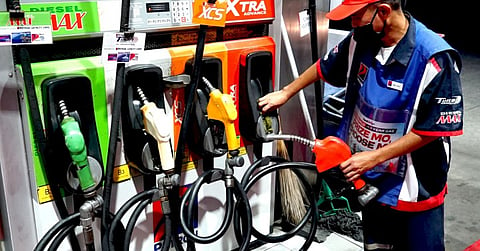
- NEWS
- the EDIT
- COMMENTARY
- BUSINESS
- LIFE
- SHOW
- ACTION
- GLOBAL GOALS
- SNAPS
- DYARYO TIRADA
- MORE

The United States’ bombing of Iran’s nuclear facilities is fueling fears of a sharper spike in global oil prices, as tensions in the Middle East threaten to choke key supply routes and unsettle already volatile energy markets.
Jetti Petroleum Inc. president Leo Bellas warned that for import-dependent economies like the Philippines, the fallout could push fuel prices even higher as rising shipping costs add pressure amid the expanding conflict zone.
“World oil prices could rise further because of the new development. The potential increase in premium and freight, which are projected to rise because of the expanded scope of hostilities, could be factored in in the expected movement on domestic prices next week,” Bellas said on Sunday.
The United States, in full coordination with Israel, launched airstrikes on three nuclear sites in Iran, an operation President Donald Trump called “successful” and “obliterating.”
However, Iranian officials confirmed the strikes but downplayed the extent of the damage.
With trading markets already reacting to the heightened geopolitical risk, a new round of price hikes looms, compounding inflation concerns and threatening to derail energy cost forecasts for the year.
Based on Jetti’s monitoring, pump prices could rise sharply next week, with diesel increasing by P4.90 to P5.10 per liter and gasoline by P3.20 to P3.40 per liter.
Despite the potential spike in prices, the Department of Energy’s Oil Management Bureau said that Dubai crude remains below the $80-per-barrel threshold required to activate government fuel subsidies.
For this year, the Department of Transportation has allocated P2.5 billion in fuel aid for public utility vehicle drivers, while the Department of Agriculture earmarked P585 million for farmers and fisherfolk.
Oil companies are mandated to maintain at least a 30-day inventory of crude oil and a 15-day stock of finished petroleum products.
Suspension of fuel taxes
Meanwhile, jeepney group PISTON calls for the temporary suspension of the implementation of excise tax in gasoline, days before the P4 per liter price hike in gasoline products.
In a radio interview, PISTON National president Mody Floranda urged president Ferdinand Marcos Jr. to issue an executive order to temporarily suspend the gasoline taxes.
“We are urging Marcos to issue an executive order suspending the implementation of high taxes on petroleum products, so that ordinary Filipinos with limited income can cope,” Floranda said.
Last 2017, former President Rodrigo Duterte signed the Tax Reform for Acceleration and Inclusion (TRAIN) into law, which increased the excise tax on gasoline and diesel from 2018 to 2020.
Under the TRAIN law, the Department of Finance said that the excise tax on oil products will only be suspended if global oil prices reach $80 per barrel.
The excise tax on diesel products is P6.00 per liter, while gasoline products are taxed at P10.00 per liter.
Transportation Secretary Vince Dizon said that the government has prepared at least P 2.5 billion, which will be distributed in the form of a fuel subsidy.
Floranda welcomes the fuel subsidy; however, he said that this is still not enough because of the big-time oil price hikes.
